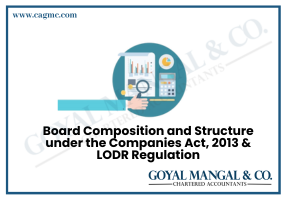
The Companies Act, 2013 and SEBI Regulations provide the concept of an independent directorship. It is seen as a step toward bringing global best practices in corporate governance to India. The Board of Directors manages the day-to-day activities of a firm, which is a legal entity. But the question is, would all the directors be liable for the carelessness or violations committed by the company, and is there a group that is vicariously liable under the provisions of the law? Let’s have a look at this article to find out the answers to of Regulatory Framework – Liability of Independent Directors.
Who is Independent Director?
In corporate governance, an Independent Director is a board member who has no material link to a company. It is not on the executive team and does not manage the company. A director who is not the managing director, a full-time director, or a nominee director is an independent director.
Thus, an independent director is a non-executive director who helps the Board of Directors to make decisions objectively and independently. When the Board of Directors works well, the company runs efficiently. Independent non-executive directors improve a company’s legitimacy and governance.
Appointment Criteria of Independent Director
The Nomination and Remuneration Committee should do due diligence to establish the person’s suitability as an Independent Director on the Board. The Company will consider the following during due diligence:
- Director must be “Fit and Proper” to be appointed as an Independent Director on the Board.
- Director must have relevant qualifications, experience, or track record in Finance, Law, Management, Sales, or other fields related to the company’s business.
- Director should have the highest personal and professional ethics, integrity, and values.
- Director must be willing to spend enough time and energy on their duties and responsibilities.
- The Nomination and Remuneration Committee may ask for more information if it thinks it’s needed to do due diligence.
- Independent/Non-Executive Directors nominated to the Board of Company should be at least 18 years old.
- Independent Director should meet all the factors for independence listed in Section 149(6) of the Companies Act, 2013 and the rules made under it.
Appointment or Reappointment of Independent Director
According to Section 149(10) of the Companies Act, 2013, Independent Directors shall be appointed for a fixed term not exceeding five years. They shall be eligible for re-appointment upon the company’s Annual General Meeting passing a special resolution and disclosing the appointment in the Board’s Report.
Section 149(11) of the Companies Act, 2013 limits independent directors to two 5-year mandates. He/she can be reappointed following a three-year cooling-off period after two consecutive terms. The Director cannot interact with the Company during the cooling-off period. If the Director is appointed for a period shorter than 5 years, it will still count as two consecutive terms.
Obligations of Independent Director
The Code of Independent Directors provides standards, duties, and functions of IDs, while the Companies Act, 2013 details the responsibilities of independent directors. The duties of independent directors consist of:
- Proper training, and making sure that their skills, information, and familiarity with the business are always up to date.
- Ask for more information or clarification when you need it, and if you need to, follow the professional advice and opinions of outside experts at the company’s cost.
- Aim to be helpful and involved in the groups of the Board where they are chairpersons or members.
- Try to go to all the meetings of the Board of Directors and any groups they are on.
- Try to go to the company’s yearly general meetings.
- Keep themselves up to date on what’s going on in the company and in the outside world.
- Make sure that any concerns they have about how the company is run, or a planned action are addressed by the Board, and if they aren’t, make sure that their concerns are written down in the meeting minutes.
- Not interfere unfairly with the work of a Board or group of the Board that is otherwise able to do its job.
- Before approving linked party transactions, pay enough attention, make sure there are enough discussions, and make sure they are in the best interests of the company.
- Find out and make sure that the business has a way to keep an eye on things that work well, and make sure that using that way won’t hurt the interests of the person using it.
- Do what they can to help protect the company’s, its shareholders, and its workers’ best interests.
- Raise concerns about unethical behaviour, real or suspected fraud, or breaking the company’s ethics policy or code of conduct.
- Do not share private and confidential information, such as trade secrets, or technologies, unless the Board has given you permission to do so or the law says you must.
Liability of Independent Directors
An Independent Director shall be held liable, only in respect of such acts of omission or commission by the listed entity which had occurred with his /her knowledge, attributable through processes of the board of directors, and with his/her consent or connivance or where he/she had not acted diligently with respect to the provisions contained in these regulations,” according to SEBI LODR,2015 Regulation 25(5). Independent Directors are accountable for the listed entity’s actions under this provision.
- When Independent Directors knew about that act
- It was done by a listed company with Independent Directors’ permission or knowledge.
- If the act of omission or commission was related to a transaction or act that was talked about and passed at committee and board meetings.
- The Independent Directors did not follow the rules in these regulations with care.
In addition to the above, SEBI LODR,2015 rules make the whole Board of Directors responsible for how well they do their jobs.
Recent Amendments
Following are the recent amendments with respect to liability of Independent Director:
- More onus to Independent Directors: Recently, the SEBI LODR,2015 was changed, and it now says that only Independent Directors can accept Related Party Transactions in the Audit Committee.
- Precedents: As a follow-up to what we’ve already seen, we’ll now look at recent cases where the role of Independent Directors was called into question. SEBI has questioned the role of Independent Directors in cases that come under Reg. 25(6) of SEBI LODR,2015 or Section 149(11) of the Companies Act, 2013. We’d see some important examples where the role of independent directors was called into question.
Regulatory Framework – Liability of Independent Directors
Independent directors are expected to exercise their duties with due care, skill, and diligence. The Companies Act, 2013 provides a legal framework for the duties and liabilities of independent directors. Section 149(6) of the Companies Act, 2013 lays down the qualifications and disqualifications for the appointment of independent directors. Section 149(7) sets out the duties of independent directors, including the duty to act in good faith, exercise independent judgment, and exercise reasonable care, skill, and diligence.
- Liability of Independent Directors: The liability of independent directors can arise in various situations, such as non-compliance with statutory requirements, breach of fiduciary duties, and mismanagement of the company. Independent directors may also be held liable for acts of omission or commission that result in losses to the company or its shareholders.
In the event of a breach of duty, independent directors may be held liable under the Companies Act, 2013, and other applicable laws. The liability may be civil or criminal, depending on the nature of the breach. Civil liability may result in compensation or damages being awarded against the independent director, whereas criminal liability may result in fines or imprisonment.
- Protection for Independent Directors: To protect Independent Directors from unwarranted legal action, the Companies Act, 2013 provides for certain safeguards. Section 149(12) of the Companies Act, 2013 provides for indemnity for Independent Directors against any loss or liability incurred by them in the performance of their duties. Additionally, companies may also take out insurance policies to cover the liability of independent directors.
Some Judicial pronouncements and regulations regarding the Liability of Independent Directors
The following are some Judicial Pronouncements regarding the Liability of Independent Directors:
- Matter of Edserv Soft Systems Ltd: Due diligence by Independent Directors prevented SEBI from penalizing them. Edserv Soft Systems Ltd. had acquired a UAE company. The Board of Directors disapproved of this transaction. Independent Directors saw this news through Stock Exchange Disclosure and questioned the firm on the acquisition, why board permission was not taken, valuation report specifics on how the price was calculated, and the source of acquisition. Edserve Sportsystems refused to provide information after Independent Directors persisted. Independent Directors resigned. SEBI did not sanction Independent Director.
- SEBI Edserv Soft Systems Ltd. Adjudication: Noticees 3 and 4 have certified the validity of the July 25, 2011, Board Resolution, which they have not contested. The Noticees claim they were unaware of the Pledge Agreement, which secured Vintage’s loan with GDR revenues.
According to the emails, the Company’s Board of Directors did not approve the use of GDR funds to acquire M/s Alta Vista, a UAE-based company. As for the second question of due diligence, Noticee Nos. 3 and 4 actively sought information and details from S. Giridharan (Noticee No. 1), the Chairman and CEO of the Company, regarding the use of the GDR proceeds and the acquisition of Alta Vista FZE, a UAE-based company.
It was also noted that after the email dated November 06, 2012, where S. Giridharan was asked about GDR proceeds, T. S. Ravichandran, Noticee No. 3, and S. Arvind, Noticee No. 4, resigned as Directors of the Company on December 10, 2012, and January 28, 2013, respectively. SEBI is inclined to give Noticee Nos. 3 and 4 the benefit of the doubt, especially considering their vigilance in using the GDR earnings and their decision to resign from the Board of Directors soon after.
- Matter of Bombay Dyeing Ltd: In this case, SEBI says that Bombay Dyeing Ltd. and one of its group companies took part in some fraudulent deals. It is also said that the group structure was kept in a way that kept these activities from being noticed.
- SEBI Bombay Dyeing Ltd. Adjudication: The Noticees were crucial Audit Committee members and Board of Directors subgroups. As process monitors, the Notices had to verify disclosures. BDMCL was able to inflate its real estate sales and earnings by Rs. 2,492.94 crores and Rs. 1,302.20 crores because the Noticees failed to perform their audit committee duties.
The Notices failed to oversee BDMCL’s financial reporting process and dissemination of its financial information to ensure that the financial statement is correct, sufficient, and believable.
Therefore, it was held that the Notices violated Clause 49(II)(D)(1) of the Listing Agreement, Clause 49(III)(D)(1) of the Listing Agreement (post amendment dated April 17, 2014) read with Regulation103 of the SEBI (LODR) Regulations, 2015, and Regulation 18(3) read with Clause A (1) under Part C of Schedule II for the period from FY 2014–15 to FY 2017–18.
Takeaway
Section 149 of the Companies Act, 2013 and the Rules thereunder require independent directors to have appropriate skills, experience, and knowledge in one or more fields of finance, law, management, etc. An independent director will help the board make decisions on strategy, performance, risk management, resources, critical appointments, and conduct. However, Independent Directors must carry out their responsibilities with due care.







